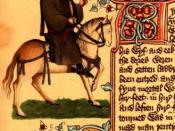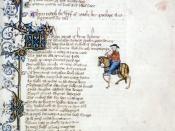There is an old saying that men come from Mars and women come from Venus.
Venus, in the Roman religion and mythology was, known as the Goddess of vegetation. She later became, known in the Greek religion and mythology, as the goddess of fertility, love, and beauty. One could describe Venus as indicative of a woman. Mars, in the Roman religion and its mythology, was known as the God of war. In the Greek religion and their mythology, he was known as Ares, the God of war. One could think of Ares as symbolizing a man. In The Canterbury Tales, written by Geoffrey Chaucer, the conflict between men and women is of divergent wills and of divergent natures. 'Will' can be defined as the mental faculty by which one intentionally chooses or decides upon a course of action: a desire, purpose, or determination, especially of one in authority, or if one does not have authority it thus produces the 'will' within a person to achieve it.
The definition of 'Nature' is the genuine character of person; the intrinsic or essential character of somebody. This essay will show how women 'will' to obtain sovereignty over their husbands in marriage and how the nature of women allows them to use devilish tricks and tactics to get what they will. In addition, how the 'will' of men in marriage is not to have conflict with their wives however; it is their nature to have sovereignty over their spouse. It will, be demonstrated through the 'will' of women and the 'nature' of men that, brings about the classical conflict between the genders in The Canterbury Tales written by Geoffrey Chaucer.
The Canterbury Tales, written, some 600 years ago, is noted by many scholars and critics alike as the masterpiece of Geoffrey Chaucer...



More places to look
Sparknotes.com
Pinkmonkey.com
These may help you undrestand better where this essay is weak on explaining things.
1 out of 1 people found this comment useful.